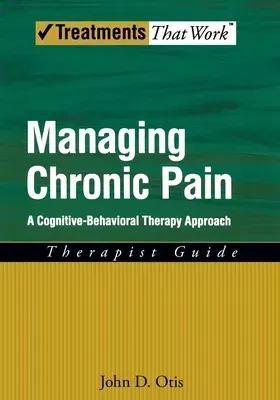Chronic pain has a multitude of causes, many of which are not well
understood or effectively treated by medical therapies. Individuals with
chronic pain often report that pain interferes with their ability to
engage in occupational, social, or recreational activities. Their
inability to engage in these everyday activities may contribute to
increased isolation, negative mood, and physical deconditioning, which
in turn can contribute to their experience of pain.
Cognitive-behavioral therapy (CBT) has been proven effective at managing
various chronic pain conditions, including rheumatoid arthritis,
osteoarthritis, chronic back pain, and tension/migraine headache. CBT
engages patients in an active coping process aimed at changing
maladaptive thoughts and behaviors that can serve to maintain and
exacerbate the experience of chronic pain. Managing Chronic Pain,
Therapist Guide distills many of these empirically validated techniques
into one convenient volume that no clinician can do without. Each
session presents the basic methods of a technique, such as stress
management, sleep hygiene, relaxation therapy, and cognitive
restructuring.
Designed to be used in conjunction with the corresponding workbook, this
therapist guide offers a complete treatment program. It provides session
outlines, sample dialogues, and homework assignments for each technique,
as well as addresses assessment and relapse. This CBT program can be
used for the successful management of chronic pain, helping patients
regain control of their lives.
TreatmentsThatWorkTM represents the gold standard of behavioral
healthcare interventions!
- All programs have been rigorously tested in clinical trials and are
backed by years of research
- A prestigious scientific advisory board, led by series
Editor-In-Chief David H. Barlow, reviews and evaluates each intervention
to ensure that it meets the highest standard of evidence so you can be
confident that you are using the most effective treatment available to
date
- Our books are reliable and effective and make it easy for you to
provide your clients with the best care available
- Our corresponding workbooks contain psychoeducational information,
forms and worksheets, and homework assignments to keep clients engaged
and motivated
- A companion website (www.oup.com/us/ttw) offers downloadable clinical
tools and helpful resources
- Continuing Education (CE) Credits are now available on select titles
in collaboration with PsychoEducational Resources, Inc. (PER)

